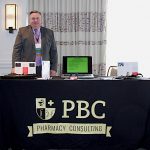Continuing education credits were available for pharmacists and nurses
Health professionals from across the health care industry were “Tuning Your Skills for Today’s Health Care Environment” while earning valuable continuing education credits at the 34th annual Seminar By the Sea Northeast Regional Conference, presented by the URI Office of Continuing Education for the Health Professions.
The conference — held March 13-15 at Gurney’s Newport Resort and Marina, 1 Goat Island, Newport — brought together pharmacists, nurses, students and clinicians from multiple health care disciplines to discuss some of the largest issues affecting health care today. Training sessions during the seminar provided continuing education credits for pharmacists and nurses.
A host of health professionals offered presentations on such topics as innovations in treatment for opioid use disorder; the importance of vaccinations and the battle anti-vaxxers wage; eating disorders; ethics in integrated health; prescription drug risk mitigation; and more. The conference’s keynote address on “The Evolving Healthcare Environment” was delivered by Louis Giancola, president and CEO of South County Health, and the Dr. Norman A. Campbell Award for Ethics and Excellence in Healthcare was presented to URI alumnus Paul B. Chace, owner of PBC Pharmacy Consulting, Inc.
“Seminar By the Sea gives health professionals from different disciplines the chance to learn from each other and discuss the most important issues affecting health care today,” said MJ Kanaczet, director of the URI Office for Continuing Education for the Health Professions. “We have a diverse group of professionals presenting on an array of compelling topics. Plus, a whole year’s worth of continuing education credits are available for nurses and pharmacists.”
The presenters and the subjects of their talks include:
- Louis Giancola, president and CEO, South County Health — “The Evolving Healthcare Environment: Reflections on the US Healthcare System at the End of a 50-year Career.”
- Diana Mercurio, clinical pharmacist, Rhode Island Primary Care Physicians Company — “Patient-centered Diabetes Therapy.”
- Nicole Chopski, chairwoman, Idaho State Board of Pharmacy — “Improving Quality of Healthcare Through State-Initiated Innovative Pharmacy Practice.”
- Mark Brouker, founder and CEO, Brouker Leadership Solutions; retired Navy Captain — “Building Trust: Practical Application of Highly Effective Leadership Behaviors.”
- Abigail Donaldson, medical director, Eating Disorder Program at Hasbro Children’s Hospital — “Eating Disorders.”
- Deanna Tran, assistant professor and codirector, Pharmacy Practice Laboratories at the University of Maryland School of Pharmacy — “The Vaxxers Immunity Wars.”
- Dennis Wichern, partner, Prescription Drug Consulting; retired special agent in charge, U.S. Drug Enforcement Agency — “Risk Mitigation: Safeguarding Your Practice.”
- Frederic Reamer, professor, School of Social Work at Rhode Island College; Robert Landau, attorney, Roberts, Carroll, Feldstein & Peirce — “Cutting-edge Ethical Issues in Integrated Health: Emerging Challenges.”
- Brandi Cotton, assistant professor, University of Rhode Island College of Pharmacy — “Strategic Innovations in Medication Assisted Treatment (MAT) for Opioid Use Disorder.”
- Kevin McConeghy, clinical pharmacy specialist, Rhode Island Veterans Affairs Medical Center; research associate, Brown University School of Public Health — “Penicillin Allergies: Myths, Facts and What to Do About It!”
- Scott Sylvester, behavioral education development specialist, Bradley Hospital — “Challenging Behavior in the Healthcare Setting.”
- Angela Butler, health advocate RRT/COPD, Hasbro/Rhode Island Hospital/Miriam Hospital — “Care Transitions Pathway with COPD and Asthma.”
- Stephen Kogut, professor of pharmacoeconomics and health outcomes research, University of Rhode Island College of Pharmacy — “I Want a New Drug: One That Won’t Make Me Nervous Wonderin’ What To Do. Recent Laws Impacting the Safety, Effectiveness and Affordability of Medication Use.”

























